[Translate to en:] COPs
The Move
Beyond Labels
Beyond Borders
Advancing Rights-Based Protection of Climate-Induced Migrants
Madrid | 2 Dec | 18:30 - 20:00 | IFEMA - Feria de Madrid | Room 3
Different normative frameworks acknowledge challenges involved in protecting climate-displaced people. However, none of these frameworks is going beyond declarations of principles, affirmations of existing norms and standards, and/or acknowledgements of good practices. How can the UNFCCC and other international frameworks go beyond symptomatic responses and advance a rights-based and transformative protection agenda? How can an international cooperation not only be expanded, but redefined to include ‘international solidarity’ and to strengthen the human rights protections for the growing numbers of the displaced by the climate crisis.
Speakers:
Harjeet Singh, Action Aid International
Sabine Minnger, Bread for the World
M. Hafijul Islan Khan, LDC Group
Nadja Charaby, Rosa-Luxemburg-Stiftung
Syed Aminul Hoque, Coastal Association for Social Transformation Trust (COAST Trust)
Madeline Garlick, UNHCR
Facilitation
Tetet Nera-Lauron, Rosa-Luxemburg-Stiftung
La exigencia central es que el WIM sea fortalecido institucionalmente y se le asignen recursos financieros propios, con el fin de poder proteger efectivamente los derechos de las personas afectadas. Esto incluye necesariamente indemnizaciones económicas, además de los miles de millones que el Norte, debido a su responsabilidad histórica, debe pagar al Sur para su protección y adaptación climática. Adicionalmente y en base de los numerosos procesos y discusiones internacionales sobre la migración climática, hace falta establecer estándares y acuerdos vinculantes para refugiades climátiques (inclusive un pasaporte especial).
More on the debates around climate-induced loss and damage and migration:
The climate crisis leads to loss, damage and displacement
Will COP25 act on the emergency?
Think piece by Nadja Charaby & Tetet Lauron
Rosa Luxemburg Foundation
“Transiciones justas”: más que “empleos verdes”, ¡una transformación socioecológica!
Otro de los temas que requieren un acompañamiento crítico es el debate acerca de las «transiciones justas» («just transition» en inglés), un concepto vago que es utilizado de diferentes formas por diversos sectores según sus intereses. Aquí, se trata de desenmascarar los impulsos de utilizar el concepto de «transiciones justas» como velo para ocultar la extensión y conservación de los intereses de las empresas y los empleos de la industria de combustibles fósiles. Indudablemente, la industria de combustibles fósiles amenaza de forma masiva la supervivencia en nuestro planeta, pero esto no quiere decir que haya que luchar contra quienes trabajan en ella. Por el contrario, la meta debe ser la reconfiguración de la economía de tal manera que ya no esté basada en la explotación de recursos – sean estos naturales, animales o humanos –, sino que forme parte de un proceso justo con la participación de todes, inclusive les trabajadores, de reestructuración de nuestra forma misma en la que gestionamos los recursos.
More on the debates around "just transition":
With Strong Unions and Strong Communities Just transition: when justice reigns, and workers & affected communities are part of the solution
Think piece by Aaron Eisenberg & Katja Voigt
Rosa Luxemburg Foundation
Es un hecho que las preguntas esenciales que serán tratadas en las negociaciones de la ONU afectan intereses básicos de los que se benefician del sistema de combustibles fósiles. Para alcanzar el éxito dentro y fuera del proceso de la ONU, la presión desde abajo es más importante que nunca . Los movimientos sociales que buscan justicia a nivel mundial – entre los cuales hay resonancias fascinantes – son alentadores: Se oponen a políticas antisociales y antiliberales, surgen en muchos casos de las bases amplias de la sociedad y lejos de la dominación de partidos políticos, y se oponen a las élites nacionales y globales. En todo el mundo se alzan y limitan con un fuerte «¡No!» el poder de quienes creen que pueden someter a los seres humanos y la naturaleza. Nos Levantaremos.
The formulations “remind” and “urge” in the closing statement seem absurd in face of the terrifying fact that global greenhouse gas emissions last year were higher than ever, and that from 2020, emissions need to be reduced by 7 percent annually in order to keep within the 1.5-degree limit demanded by those most affected by climate change. Given the present dynamic, it is difficult to imagine that the countries will introduce adequate measures by next year.
In this light, even the EU’s advances, the recently passed draft for a ‘Green Deal’—which was personally presented in Madrid by European Commission President Ursula von der Leyen in an attempt to bring some momentum to the negotiations—should be taken with a healthy dose of scepticism. Announced as a major programme to restructure the European economy, the ‘Green Deal’ clings to the illusion that ‘green’ growth is compatible with effective climate change mitigation measures, and threatens to give renewed impetus to European resource imperialism.
More on our critique on "green capitalism":
Pumping the Brakes on E-cars Unmasking the Fantasy of Green Capitalism
Think piece by Alanah Torralba, Tadzio Müller & Elis Soldatelli
Rosa Luxemburg Foundation
La formulación con las palabras «recordar» y «exhortar» resulta absurda ante el hecho aterrorizante de que el año pasado la emisión de gases de invernadero fue más alta que nunca y que a partir de 2020 las emisiones deben disminuir en un 7% anual, para mantener el límite de 1,5 grados exigido por les más afectades por el calentamiento global. La dinámica actual hace difícil imaginar que cada país presente medidas suficientes el próximo año.
En este sentido, también debe ser vista con escepticismo la propuesta de un «Green Deal» para la Unión Europea, cuyo borrador fue presentado en Madrid en persona por Ursula von der Leyen, presidenta de la Comisión Europea, para dar dinamismo a las negociaciones. Anunciado como un gran programa de reestructuración para la economía, el «Green Deal» se aferra a la ilusión de que una protección climática efectiva puede estar asociada a un crecimiento «verde» y amenaza con reavivar el imperialismo de recursos de los países europeos.
More on our critique on "green capitalism":
Pumping the Brakes on E-cars Unmasking the Fantasy of Green Capitalism
Think piece by Alanah Torralba, Tadzio Müller & Elis Soldatelli
Rosa Luxemburg Foundation
(text only available in english)
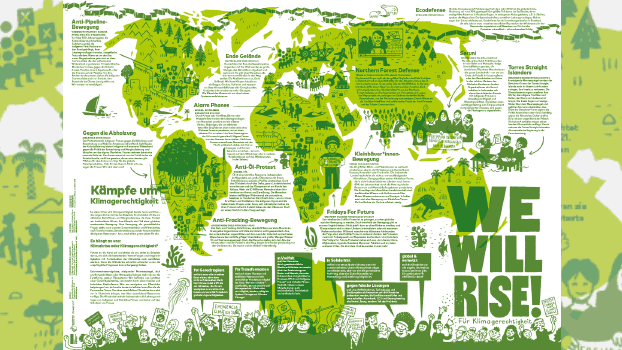
#WeWillRise
Climate crisis or climate justice? Choose your side!
Order now our double-sided map of global hotspots
This makes it clear that the ‘summit dramaturgy’ of the United Nations, which this year, in face of the increasing severity of the crisis, attempted to use the September summit in New York to create some positive momentum that would lead to a change of course, to real commitments to substantial action, and to an increase in moral pressure, has resoundingly failed. The promises from New York have no effect in Madrid; the UN system is incapable of creating coherence. The chasm separating necessity and reality is wider than ever. This failure was already built into in the Paris Agreement, which relies on the idea that, in face of the climate crisis and driven by moral pressure from the international community, countries will increase their climate targets in good time and, most importantly, will actually implement them. But they would have to do this despite the interests of the fossil fuel lobby, members of which are intimately entwined with political elites in the form of ‘toxic alliances’ and, as sponsors of the climate summit, have been given a place at the negotiating table. And despite the struggles of individual nations pursing their own advantage in an economic system based on the competitive logic of the market. And despite the logic of profit and growth, which is so deeply engrained in corporate structures, the financial system, and government and social programmes.
This became evident with respect to one of the central negotiation questions in Madrid: deciding on a uniform time frame for establishing national climate targets. Although climate targets are the core of the Paris Agreement, this particular issue has been repeatedly deferred, which does not bode well for their implementation. Countries are using the deferral of the decision on a time frame as a delay tactic.
The UN’s crisis of legitimacy
The UN climate governance regime is suffering a deep and multifaceted crisis of legitimacy. On the one hand, it is a result of the multiplication of the crises of legitimacy being experienced by all governments who refuse to recognize the climate crisis for what it really is: a planetary emergency that necessitates the complete reorganization of political, economic, and social priorities and activities. And on the other, the crisis of legitimacy derives from the fact that millions of people who bear little or no responsibility for the emergence of the climate crisis are deliberately being left to deal with its dramatic consequences on their own. For even though extreme storm events, unprecedented droughts, and rising sea-levels are already threatening the livelihoods and survival of millions of people—and these numbers will only continue to rise—the issue of loss and damage caused by climate change has been repeatedly played down and brushed aside and for years. And things were no different in Madrid. The countries of the Global South have again vocally demanded that the way loss and damage is dealt with—which to date has only been through an exchange platform known as the Warsaw International Mechanism—should be institutionally grounded in the Paris Agreement and that extensive funds be made available for this purpose. Discussions on the matter have been a struggle over accountability, for it is the most industrialized countries who bear the most responsibility for the climate crisis and who even today are substantially profiting from it, and they ought to be the ones to pay.
Lo anterior demuestra el fracaso de la «puesta en escena de la cumbre» de la ONU, la cual, en vista de una crisis cada vez más evidente, intentó generar en la cumbre de Nueva York un impulso de arranque, de compromiso con la política climática, de presión moral. Las promesas de Nueva York no tuvieron efecto en Madrid; el sistema de las Naciones Unidas no tiene coherencia. La brecha entre lo necesario y lo real es más enorme que nunca. Este fracaso hace ya parte del Acuerdo de París, el cual le apuesta a que, frente a la crisis climática, los Estados, movidos por la presión moral de la comunidad global, incrementarán sus metas climáticas y, sobre todo, que las cumplirán. Entiéndase que esto implica ir en contra de los intereses del cabildeo de los combustibles fósiles, estrechamente entrelazados con las élites políticas por medio de «alianzas tóxicas», a cuyos representantes se les permitió sentarse a la mesa de negociaciones como patrocinadores. Y en contra de la lucha por ventajas nacionales en un sistema económico basado en la lógica de la competitividad y en el mercado. En contra de la lógica del lucro y el crecimiento, tan profundamente grabada en las estructuras empresariales, los sistemas monetarios y los programas gubernamentales y sociales.
En Madrid, esto se hizo evidente en uno de los temas centrales de las negociaciones: la votación de un cronograma para presentar las metas climáticas nacionales. A pesar de que las metas climáticas constituyen el corazón del Acuerdo de París, este punto fue pospuesto una y otra vez, lo cual no augura nada bueno para el cumplimiento de las metas. Los países utilizan el aplazamiento de la votación del cronograma como táctica dilatoria.
Crisis de legitimidad de la ONU
El régimen climático de la ONU se encuentra en una crisis de legitimidad profunda, y esta tiene muchas facetas. Por un lado, se trata de la crisis de legitimidad potencializada de todos los gobiernos que no tratan la crisis climática como lo que es: una emergencia planetaria que implica la necesidad de reestructurar por completo las prioridades de la acción política, económica y social. Y, por el otro, una crisis de legitimidad causada por el hecho de que millones de personas que no contribuyen nada o prácticamente nada a la crisis climática son abandonadas a su suerte a sabiendas de sus dramáticas consecuencias. Pues a pesar de que el sustento y la existencia misma de millones de personas está desde ya siendo amenazada por súper tormentas, sequías extremas y el aumento del nivel del mar, el tema de los daños y pérdidas asociados al clima se evade y minimiza desde hace años. También en Madrid. Los países del Sur global volvieron a exigir vehementemente que el sistema para lidiar con daños y pérdidas —que hasta ahora solo han sido regulados por medio de una plataforma de intercambio en el llamado Mecanismo de Varsovia— se ancle institucionalmente en el marco del Acuerdo de París y sea dotado de fondos suficientes. Las discusiones entorno a este tema hacen parte de una lucha por que se asuma la responsabilidad de la crisis: los primeros países industrializados, que son los mayores responsables de la crisis climática y que hasta hoy se lucran de ella, deberían pagar.
Climate-induced migration
Madrid | 3 Dec | 11:00 - 12:30 | IFEMA - Feria de Madrid | German Pavilion | hall 6 stand 6A36.
The poorest and most vulnerable people are the least responsible for climate change but are alredy the most impacted. The protection need is growing especially for people from the South Pacific who are forced to relocate and even migrate due to intensive storms and sea level rise, which is threatening their lives and livelihoods. It is urgent to provide the protection status to those people in need to ensure that no one is left behind in the climate crisis.
Speakers:
Maina Talia, Church of Tuvalu, TANGO, TUCAN
Tetet Lauron, Rosa-Luxemburg-Stiftung Philippines
Sabine Minninger, Bread for the World
Anne Spiegel, Hon. Minister for Integration in Rhineland Palatinate, Germany
Facilitation
Nadja Charaby, Rosa-Luxemburg-Stiftung
Verhandlungen über Verluste und Schäden - Interview mit Hafijul Islam Khan
Verhandlungen über Verluste und Schäden - Interview mit Hafijul Islam Khan
Interview with Hafijul Islam Khan, negotiator at COP25 for the Least Developed Countries group (LDC), on the demands of the Global South on climate-induced loss and damage
But those countries have again brushed aside demands for an independent fund. The closing statement instead refers to the inadequately endowed Green Climate Fund, to which countries can already apply for financial means for climate adaptation and climate change mitigation measures. In other words, the already far-too-small cake is going to be cut into even smaller pieces. A strong financial architecture for dealing with loss and damage is urgently needed. It is shameful that despite this year’s climate catastrophes industrial countries have shown no willingness to make additional funding available for loss and damage caused by climate change. What we now have before us is the continuation of a racist division of the world and the concentrated hegemony of the Global North in the UN system.
More on the debates around climate-induced loss and damage and migration:
The climate crisis leads to loss, damage and displacement
Will COP25 act on the emergency?
Think piece by Nadja Charaby & Tetet Lauron
Rosa Luxemburg Foundation
We do not need any new markets
The legitimacy of the UN climate governance system has also been hollowed out in other ways, as demonstrated by discussions over Article 6 of the Paris Agreement, on the establishment of a carbon emissions trading scheme. Numerous studies have proven how vulnerable market systems are to the exploitation of loopholes and how much pressure is applied to human rights and ecosystems when they are transformed into commodities. The effectiveness of such mechanisms for combatting climate change has not yet been established. The extent to which the profit logic threatens to win out is already clear from the wording of the regulations. There continues to be controversy over whether the regulations should contain a reference to respect for human rights. The fact that some countries, such as Saudi Arabia, have attempted to exclude references to human rights from the resolutions is already scandalous in itself. But the fact that something self-evident is allowed to be called into question without provoking vociferous protest from the majority of countries reveals the deep structural problems with market mechanisms. We have already seen how the trading of Clean Development Mechanism certificates as part of the Kyoto Protocol led to numerous human rights abuses.
So it is perhaps good that for the moment, Madrid has not led to decisions on introducing market rules. This was mainly due to two issues: first, whether old certificates from the Kyoto trading scheme could be carried over to the new one, which is primarily desired by the USA, Australia, Brazil, and India; and second, whether carbon credits should be allowed to be counted twice, which is primarily desired by Brazil. Were these two demands to be implemented, then the already questionable climate change mitigation power of the trading scheme would be further undermined. The serious danger is that the countries might finally decide on the introduction of the market mechanism at the COP26 in Glasgow, Scotland. Many countries have coupled an increase in national climate targets to the existence of such a market mechanism.
Overall, negotiations at the UN summit are becoming more adversarial, with the opposing camps becoming increasingly uncompromising. This can be seen not only in the negotiations themselves, where the legitimate demands of certain countries are falling on the deaf ears of countries with right-wing populist governments, who are pig-headedly pursuing their own interests. It can also be seen in interactions with the members of civil society in attendance. A remarkable number of actions by different constituencies (groups into which observers from different sectors of society are organized, such as the Women & Gender Constituency) were denied approval by the UN Climate Change Secretariat this year. And it can also be seen in an exemplary way in the fact that around 300 civil society groups were ejected from the conference premises in the middle of the second week of negotiations. They had loudly voiced their disappointment at the selling out of our future in an unregistered protest action in front of the plenary hall, also demanding that human rights be respected and calling for more ambitious targets to tackle the climate crisis, both of which ought to be unquestioned objectives given the nature of the crisis. Yet they were immediately shoved through the huge metallic doors—some quite roughly—and out into the cold, so that the negotiations could continue uninterrupted in the plenary hall. For a while it was unclear if the participants were at risk of losing their access permits to the negotiation areas. Ultimately this did not occur, but it was a serious concern for the activists, many of whom represent indigenous communities, women’s rights groups, and small farmers, and depend on the UN premises as a safe space to engage in legitimate protest.
Entrevista con Hafijul Islam Khan, Least Developed Countries group (LDC), sobre pérdidas y daños
Sin embargo, estos mismos países rechazaron la petición de que haya un fondo independiente. El documento final habla, en cambio, del Green Climate Fund (Fondo Verde para el Clima), un fondo (mal abastecido) ante el cual los países pueden solicitar recursos para medidas de adaptación y protección del clima. En otras palabras, el pastel, de entrada demasiado pequeño, debe ser repartido. Es urgente desarrollar una arquitectura financiera fuerte para lidiar con los daños y las pérdidas. Es vergonzoso que los países industrializados no muestren ninguna voluntad de procurar fuentes financieras adicionales para suplir los daños y las pérdidas producto del cambio climático a pesar de las múltiples catástrofes climáticas de este año. Estamos ante una continuidad de la distribución racista del mundo y la hegemonía acumulada del Norte global en el sistema de la ONU.
More on the debates around climate-induced loss and damage and migration:
The climate crisis leads to loss, damage and displacement
Will COP25 act on the emergency?
Think piece by Nadja Charaby & Tetet Lauron
Rosa Luxemburg Foundation
(text only available in english)
Otro punto que ha socavado la legitimidad del régimen climático de las Naciones Unidas, como muestran las discusiones acerca del Artículo 6 del Acuerdo de París, es su anclaje en un sistema comercial con derechos de emisión de CO2. Numerosos estudios demuestran lo propensos que son los sistemas de mercado a tener vacíos, así como la presión a la que son sometidos los derechos humanos y los ecosistemas cuando son tratados como bienes mercantiles. La misma formulación de las reglas deja ya en claro que la lógica del lucro amenaza con perpetuarse. La pregunta acerca de si las reglas deben referirse a la protección de los derechos humanos ha sido y sigue siendo polémica. Es de entrada escandaloso que algunos países, como Arabia Saudita, intenten desterrar de las resoluciones las referencias a los derechos humanos; pero el hecho de que lo evidente pueda siquiera ponerse en duda sin que la mayoría de los países protesten a todo pulmón revela el profundo problema estructural de los mecanismos del mercado. Las experiencias del comercio con los certificados CDM del Protocolo de Kioto muestran numerosas violaciones a los derechos humanos.
Es bueno, entonces, que no se haya tomado una decisión acerca de la implementación de reglas del mercado en Madrid. Esto se debió sobre todo a dos preguntas: si es posible transferir certificados viejos del régimen comercial de Kioto, como quieren sobre todo Estados Unidos, Australia, Brasil e India; y si debería aceptarse la doble deducción de los derechos de emisión, como quiere sobre todo Brasil. Si se implementaran estas demandas, subvertirían aún más el ya cuestionable efecto de este tipo de mecanismo de mercado para proteger el clima. El gran riesgo es que se logre introducir un mecanismo de mercado en la COP26 que se celebrará en Glasgow, Escocia. Muchos países han vinculado el crecimiento de sus metas climáticas nacionales a la existencia de un mecanismo de mercado de este tipo.
En términos generales, el tono se ha vuelto más severo en la cumbre de la ONU; los frentes se están volviendo más rígidos. No solo en las negociaciones, en las que sobre todo los gobiernos populistas de derecha rechazan con todas sus fuerzas las exigencias legítimas de otros Estados en pro de sus propios intereses, sino también en la forma de aproximarse a la sociedad civil. Es llamativo que la Secretaría de la CMNUCC no haya aprobado muchas de las campañas de las agrupaciones de ONG (grupos temáticos, conocidos como «constituencies», en los que se organizan las agrupaciones observadoras, por ejemplo, la Women & Gender Constituency). Otro caso ejemplar es la expulsión de cerca de 300 observadores y observadoras de la sociedad civil de la sede de conferencias a mediados de la segunda semana de negociaciones. En una protesta no registrada con anterioridad frente a la sala plenaria, les observadores habían expresado a viva voz su decepción por la venta de nuestro futuro y habían exigido la protección de los derechos humanos y metas más ambiciosas para combatir la crisis climática. Aunque se trata de cuestiones obvias en vista de la crisis, de inmediato fueron expulsados bruscamente por las enormes puertas de metal, para que las negociaciones pudieran continuar sin interrupciones en la sala de plenos. Por varios días no fue claro si les participantes podían perder su acreditación para entrar en la zona de negociaciones. Aunque finalmente no ocurrió, esto desconcierta a les activistas, que incluyen representantes de comunidades indígenas, defensoras de los derechos de la mujer y campesines, que necesitan que la cumbre de la ONU sea un lugar seguro para la protesta legítima.
Energy in Latin America: from business to common
Santiago de Chile | 5 Dec | 10:00 - 12:00 | University of Santiago de Chile, USACH Macarena | Av. Ecuador 3659 - Comuna Estación Central | Valdes room
Rosa- Luxemburg-Stiftung - through a cooperative effort of its offices in Buenos Aires/Argentina, Mexico City/Mexico, Quito/Ecuador and São Paulo/Brazil - is delighted to present a publication that maps alternative projects of generating and/or manufacturing renewable energy on a local level, carried out in 2018 in nine Latin American countries. The publication is part of the "Energy and Climate Program" of the Foundation for Latin America and is embedded in a perspective that defines energy as a need and a right. Energy should be demarketed and decoupled from the logics of financial speculation because it is fundamental for the processes of life reproduction.
Speakers:
Diego di Risio, Rosa-Luxemburg-Stiftung (Cono Sur office)
Carla Vázquez, Rosa-Luxemburg-Stiftung (Mexico, Centro America y El Caribe office)
Laura Rodriguez, Rosa-Luxemburg-Stiftung (Andean Region office)
Juan Pablo Soler, engineer specialized in energy and society, from Colombia
Teresa Bonilla, member of the electric union Agrupación de Funcionarios de la UTE (AUTE), from Uruguay
Facilitation
Elis Soldatelli, Rosa-Luxemburg-Stiftung (Coordinator of the Energy and Climate Program for Latin America)
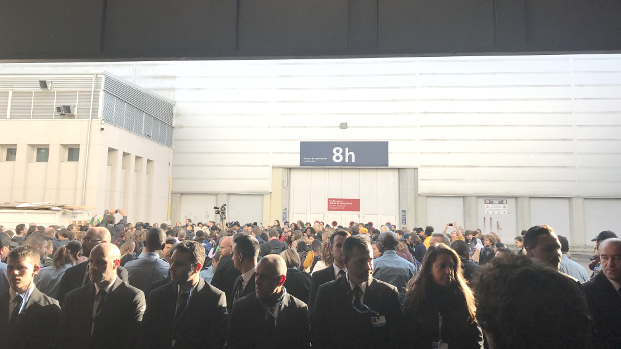

We need much stronger movements
For climate movements worldwide, COP25 is yet another piece in the puzzle of an ominous reality. 2019 has been a significant year: never before have so many people demonstrated in the name of more climate action. Political and economic decision-makers have deftly taken this up, but in a merely rhetorical manner. The Spanish government, for example, put up big posters around Madrid that read “Don’t call it climate change, call it a climate emergency”. Over and over at the UN climate conference people kept saying “The world is watching us”. It would be dangerous to be lulled into a false sense of security by this and by the at times very consciously staged summit dramaturgy, both of which primarily attempt to do one thing: generate legitimacy for those involved. Real and substantial reductions to greenhouse gas emissions and real and comprehensive financial and technological transfer are the only adequate responses to the crisis. Climate movements are right to refuse to accept anything less in this regard.
The fossil fuel lobby and reluctant governments are co-opting the social movements and their metaphors in various ways. So it is important, for example, to debunk the idea that natural gas is a ‘bridge fuel’, which is designed to extend the fossil fuel age decades into the future. And it is important to prevent supposedly ‘nature-based solutions’ being suddenly carried out by corporations with high levels of pesticides and lots of high-tech equipment. And it is important to debunk the use of the concept of a ‘just transition’ as a pretext for protecting well-paid fossil fuel industry jobs in the Global North, rather than to promote a comprehensive and global socio-ecological transformation.
More on the debates around "just transition":
With Strong Unions and Strong Communities
Just transition: when justice reigns, and workers & affected communities are part of the solution
Think piece by Aaron Eisenberg & Katja Voigt
Rosa Luxemburg Foundation
But we need a lot more than this. On the Sunday following the closing of the summit, climate activists began discussing the fact that the movements need to become not only much bigger and broader, but also much, much more disruptive. The question behind this is how can we escalate the conflicts around ambitious climate policies in each of the respective national and regional contexts such that they transcend the level of mere rhetoric and bring about real change. Such a goal will entail different strategies in different countries. Activists from the Global South rightly point out that in democratic countries with relative legal stability, different forms of action are possible than in autocratic countries. Being aware of one’s own privilege in the Global North and using it effectively to force one’s government to take responsibility means showing solidarity with the millions of people who are suffering most from the climate crisis and with the movements of the Global South.
Para los movimientos climáticos internacionales la COP25 es solo una ficha de un rompecabezas en medio de una realidad amenazante. 2019 fue un año especial porque nunca antes habían salido a la calle tantas personas en favor de la protección del clima. A nivel puramente retórico, les encargades de tomar decisiones económicas y políticas adoptaron estas solicitudes como es debido. El gobierno español llenó Madrid de grandes pancartas que decían «Do not call it climate change, call it climate emergency» (No lo llames cambio climático, llámalo emergencia climática); y en la sede de conferencias se escuchaba una y otra vez «the world is watching us» («el mundo nos está vigilando»). No obstante, sería peligroso dejarse convencer por este teatro de la cumbre, una puesta en escena en parte deliberada, cuyo principal objetivo es fabricar legitimidad en el campo de la política climática. La única reacción razonable ante la crisis es la disminución real y radical de la emisión de gases de invernadero y una amplia transferencia de recursos financieros y tecnológicos. Los movimientos ambientalistas hacen bien en no ceder ni una pizca más en su discurso.
En muchas partes se puede ver cómo el cabildeo de los combustibles fósiles y los gobiernos reticentes a los cambios se apropian de los movimientos y sus metáforas. Es preciso desenmascarar al «gas natural» como una «tecnología puente» que busca continuar la era de los combustibles fósiles por décadas. Es preciso evitar que las «soluciones naturales» sean de repente impulsadas por grandes conglomerados de pesticidas y tecnologías avanzadas. Y es preciso desenmascarar el hecho de que el concepto «transición justa» se usa para cementar puestos bien remunerados en la industria de combustibles fósiles en el Norte global, en lugar de adelantar un cambio ecológico y social que sea global y abarcador.
More on the debates around "just transition":
With Strong Unions and Strong Communities
Just transition: when justice reigns, and workers & affected communities are part of the solution
Think piece by Aaron Eisenberg & Katja Voigt
Rosa Luxemburg Foundation
(text only available in english)
Pero hace falta mucho más. El domingo después de la cumbre les activistas empezaron a discutir acerca de por qué no solo es necesario que los movimientos se vuelvan más grandes y amplios, sino, sobre todo, más incómodos. La pregunta subyacente es cómo hacer que los conflictos relacionados con una política climática ambiciosa en los contextos nacionales y regionales correspondientes escalen de tal forma que den lugar a cambios reales y no sean solo simbólicos. Esto puede implicar estrategias distintas en cada país. Les activistas del Sur global advierten, con razón, que las campañas que pueden llevarse acabo en Estados democráticos con una cierta seguridad legal son distintas a las que pueden llevarse a cabo en Estados autocráticos. Ser conscientes de los propios privilegios por pertenecer al Norte global y utilizarlos efectivamente para responsabilizar al propio gobierno significa ser solidaries con los millones de personas afectadas por la crisis climática y los movimientos ambientales del Sur global.
«Hold your countries responsible» Interview with Dipti Bhatnagar
«Hold your countries responsible» Interview with Dipti Bhatnagar
Entrevista con Dipti Bhatnagar, de Amigos de la Tierra Internacional. ¿Conseguirá el movimiento climático global presionar a los gobiernos para que se muevan? ¿Cuál es la responsabilidad especial de los movimientos del Norte global?
Interview with Dipti Bhatnagar, Friends of the Earth International, on the chances of the global climate movement to put pressure on governments for more ambitious climate policies and the specific responsibility of the Global North movements
Interview with Dipti Bhatnagar, Friends of the Earth International, on the chances of the global climate movement to put pressure on governments for more ambitious climate policies and the specific responsibility of the Global North movements
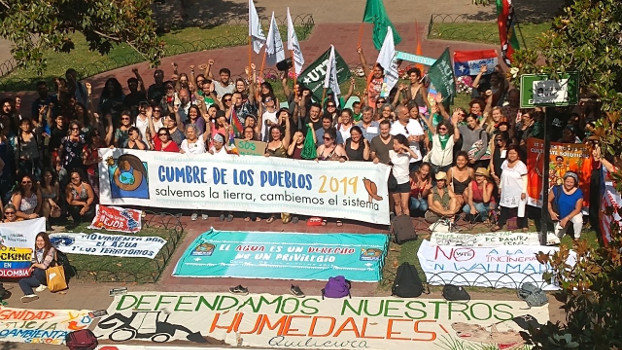
The extent to which the precise configuration of any new constitution is closely connected to environmental and climate issues becomes clear when one considers the example of water. The Water Code enshrined in the 1980 constitution introduced under Pinochet provided the framework for the total privatization of water in Chile, thereby serving the interests of mining companies, agribusiness, and those with investments in forestry. “Three quarters of Chile is currently experiencing extreme drought”, Cuenca says. “Despite this, the Piñera government wanted to further expand the privatization of water in order to provide corporations even more security on their investments.”
Beyond Chile
The alternative summits, made up of over a hundred events, have primarily been shaped by their Latin American participants, although they are being attended by activists from all around the world. Discussions have by no means been limited to debates around the situation currently unfolding in Chile, with additional discussion topics including attendees’ varied experiences of constitutional conventions in the region, as well as the background to the protests also currently occurring in Bolivia, Ecuador, and Columbia and the parallels that can be drawn between them and the situation in Chile. Side by side, survivors of Pinochet’s military dictatorship and younger generations have engaged in collective reflection on the different forms that buen vivir, the good life, might now take. Additionally, the summit has published a declaration which includes the movement’s key demands. The declaration also condemns the fact that despite the intensity of the state violence deployed by the Chilean government against its own citizens, it has managed to retain the presidency of the COP25 summit.
With around 300 related events, Chilean and Latin American activists and issues have also taken up plenty of space at the “Cumbre Social por el Clima” in Madrid, with the summit as a whole placing strong emphasis on voices from the Global South and indigenous communities. “COP25 should be taking place in Chile,” says Angela Valenzuela of Fridays for Future Chile. “We are striving to ensure that voices from our part of the world are heard here.” This is important, as the protests threaten to be overshadowed by the extremely complex and multi-faceted negotiations taking place inside the UN conference centre, even if some more critical side events, such as one on the subject of Alto Maipo, are also taking place. Chile’s holding of the COP presidency means that such subjects are of course being swept under the rug. In contrast, the “Cumbre” has been dedicating considerable time and space to these topics, which include strategic networking, agrarian ecology, the exchange of practical knowledge and resistance tactics aimed at countering REDD+ projects, land rights, and feminist networking.
![[Translate to en:] Auf dem "Cumbre Social por el Clima" finden vom 6.-13.12. mehr als 300 Veranstaltungen statt. Auf dem "Cumbre Social por el Clima" finden vom 6.-13.12. mehr als 300 Veranstaltungen statt.](/fileadmin/images/Themen/Klimagerechtigkeit/Cumbre_Madrid2.JPG)
A fundamental commonality connects the demonstrations, protests, and activities occurring in Santiago and in Madrid: the feeling of an ever-expanding disparity between the pressure generated by millions of people taking to the streets worldwide, on the one hand, and the business-as-usual approach of national governments on the other, between the rapid progression of the climate crisis and political responses to it. This discrepancy can be neatly illustrated by a single number: since the adoption of the Paris Agreement, global emissions have gone up by four percent. This feeling of disparity is further strengthened by the fact that large corporations and banks such as Santander, Suez, Iberdrola, and endesa are all sponsors of COP25, meaning that their lobbyists are able to influence negotiations. In contrast, the “Toxic Tour” through Madrid, which sought to highlight the disastrous influence of said banks and corporations on the climate crisis, was shut down by police.
Attempts to Exert Influence at Very Many Levels
The organizations, groups, and NGOs with observer accreditation at COP25 are attempting to gain influence and exert pressure on a number of different levels within the context of negotiations. Although the previous year’s climate summit yielded a set of rules for the implementation of the Paris Agreement, the UN response to the climate crisis, as ever, continues to proceed at a much slower pace than the crisis itself. Many of the aspects up for negotiation seem to be heading catastrophically in the wrong direction: participating countries continue to haggle over the configuration of market mechanisms for carbon trading, despite experience showing that such measures simply get in the way of the urgently necessary transformation of the economy and could have devastating consequences for both humans and nature. The extent to which the logic of profit is supposed to be able to function unimpeded is made clearly apparent in that even the smallest reference to the enshrinement of human rights and other safeguards, such as on women’s rights, threaten to be struck from the corresponding article of the Paris Agreement rulebook.
In addition, a key issue for this year’s COP is the fact that the industrialized countries continue to refuse to even discuss the fact that they will need to make substantial financial contributions to compensate for the extensive damage already caused by the climate crisis up to this point. Nor have countries agreed upon a shared timetable for the announcement of their individual climate targets (NDCs) and accompanying measures. The lack of coordination is disastrous, in that this mechanism is crucial to the Paris Agreement rules, forming as it does the foundation of the system used to regularly assess whether the efforts of the global community concerning the climate crisis are in fact adequate. Meanwhile mechanisms and technologies such as carbon trading, nuclear power, and carbon dioxide storage technology, which make it possible to cash in on the climate crisis, are given support.
Thankfully, national representatives are not able to negotiate such matters in secret. This is due to the efforts of representatives of social movements—particularly those from the Global South—to hold negotiators to account, speaking with them at summits and conferences, exerting pressure on their own delegations, and reporting their findings back to those in their home countries in order to increase support for ambitious policies to tackle climate change. Through creative initiatives at the summits themselves, expert knowledge of the negotiations, public relations work, conversations with delegates, and networking with other activists on-site, social movements close to the negotiations are doing their best to monitor them with a critical eye. Activists are also always quick to remind one another that they must use the privilege of being able to travel to the UN summits effectively and strategically, in order to exert as much influence as possible. Where are there windows of opportunity? Where is there momentum to be harnessed?
Along with the aforementioned strong links between activists in Santiago de Chile and Madrid, alliances have formed between indigenous peoples, grassroots organizations, civic organizations, feminist groups, NGOs, and other activist groups the world over to create an increasingly dense web of resistance against a dramatically advancing crisis that spans the entire planet. These civic networks are strong and creative, and pull together—but unfortunately their protests have so far had little effect in the real world. Emissions continue to increase and fossil-fuel companies are permitted to go on as usual as if nothing was wrong, while millions of people are forced to endure the increasingly dangerous effects of the climate crisis.
Greta Thunberg is right when she says that “we have achieved nothing so far”—climate justice movements must become much, much stronger before they will be able to achieve their desired aims, a project that requires each and every one of us to get involved.
The Move
The Paris Agreement, the COPs and the WIM – it’s all not where it needs to be
So far the COP decisions on ‘displacement and migration” were just reiteration of earlier issues, i.e. knowledge generation, development of technical papers and strengthening coordination among different actors outside of the UNFCCC etc. Moreover, discussion at different COPs surfaced debates on the theoretical perspectives of considering the issue plainly as a humanitarian crisis, while bypassing obligation of the countries to correct the ‘manifest injustice’ that caused/and exacerbate the crisis.
Hence, policy discussion around climate induced displacement and migration should comprehensively cover the entirety of ‘displacement and migration’ along with their key drivers e.g. climate change impacts and climate processes. This is not disaster displacement, as, literally, disaster displaced are similar to the IDPs that lacks the trans-boundary dimension.
The "Warsaw International Mechanism on Loss and Damage" of the UNFCCC offers an important multilateral negotiating lever. However, the polluter states have so far refused to make additional funds available. This blocking on finance obligations is linked in the overall to the industrialized countries‘ strong position against ‚liability and compensation‘ for losses and damages. The WIM is to be reviewed at COP25, and pressure must be exerted on the negotiators to create a functioning mechanism for climate-induced loss and damage.
It remains important to exert political pressure on the German government to fulfil its obligations. Here, climate justice movements will have to play an important role.
Negotiations should not be limited only within the mandate and timeframe of the Paris Agreement nor the WIM only. The scope and measures for addressing displacement and migration should be reflected throughout the UNFCCC. Merging displacement and migration to the loss and damage work-stream made this issue indistinguishable. It is unlikely that the WIM would be able to adequately address the issue unless an independent institutional and governance mechanism is established under the Convention. Such a protocol should be drawn on the basis of the founding principles of the UNFCCC such as ‘common but differentiated responsibilities and respective capacities’ (CBDR-RC) and should focus both at international and domestic levels to ensure comprehensive protection from the impacts of climate change, and guarantee protection of substantive human rights as per international law.
At the same time it remains important to exert political pressure on the German government to fulfil its obligations. Here, climate justice movements will have to play an important role. Fighting against coal mines and fossil power plants is crucial to the struggle against the climate crisis, but as the devastation is already ongoing and since it requires the global north starting to pay off its ecological dept, the demands for compensation and finance for loss and damage must be taken on as well.
«Commit to build the capacities of peoples on the ground, fortify solidarity among communities, movements and networks from the local to the global level through knowledge sharing and supporting one another’s campaigns and other initiatives. Evidence-based policy recommendations through scientific research shall be developed in close partnership with grassroots communities and sectors.» (The Manila Initiative on the Rights of Climate Migrants 2019)
The causes of flight must be combated consistently where they are generated. To fight the climate crisis still means a consistent climate policy in the rich and industrialized states that recognises the interests and rights of those who have contributed the least, such as the people in the global South. It also means overcoming a racist and neocolonial power structure.
«Only through a comprehensive restructuring of the economy and the society can climate justice be achieved. We must address the root causes of climate change, social inequality and injustice, and forced displacement.» (The Manila Initiative on the Rights of Climate Migrants 2019)
Indigenous Peoples and Traditional Knowledge in the Context of the UN Framework Convention on Climate Change
Compilation of Decisions and Conclusions Adopted by the Parties to the Convention - 2019 Update
Edited by Sébastien Duyck, with contributions from Kim Gottschalk
Political ecology of the new geografies of coal
The coal chain between Columbia and Turkey
Series
Towards a Post Coal Mining Colombia: Contributions for a Socio-Environmentally Just Transition
by Andrea Cardoso & Ethemcan Turhan
Cómo salir de la dependencia del carbón?
Elementos para debatir una transición socioeconómica en la Guajira
Serie
Hacia una Colombia post minería de carbón: aportes para una transición social y ambientalmente jusía
Social impacts of climate change in Mekong Delta
The victims of climate change
The social impact of climate change at the Vietnamese side of the Mekong River Delta
By Steffen Rohkohl
Community Consultation and Monitoring in Hydropower Projects
A Manual
By Lam Thi Thu Suu
Rosa Luxemburg Foundation Southeast Asia in cooperation with the Centre for Social Research and Development (CSRD)
Dual-use Approaches for Solar Energy and Food Production
International Experience and Potentials for Vietnam
Rosa Luxemburg Foundation Southeast Asia in cooperation with GreenID Vietnam
Women and Climate Change in Nigeria
An interview with Caroline Usikpedo Founder and Executive Director of the Noble Delta Women for Peace and Development organisation
School of Ecology Uyo
Seeing REDD : Communities, Forests and Carbon Trading in Nigeria
Up in Smoke: Gas Flaring, Communities and Carbon Trading in Nigeria
By Isaac 'Asume' Osuoka, Gibson Ikanone, Vivian Bellonwu-Okafor, Orike Didi
The Road Less Travelled
Reclaiming Public Transport for Climate-ready Mobility
Trade Unions for Energy Democracy (TUED) in cooperation with the Rosa Luxemburg Foundation New York Office and the Murphy Institute at the City University of New York
Perspectives on Colombian Coal Exports
On the International Steam Coal Market until 2030
Series
Towards a Post Coal Mining Colombia: Contributions for a Socio-Environmentally Just Transition
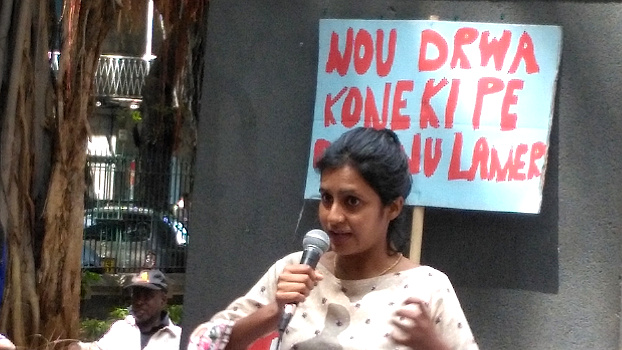
"The global ecological crisis is a direct by-product of the dominant capitalist system." | Kashmira Banee, CARES, Mauritius
"Facing climate and ecological emergency, the Centre for Alternative Research and Studies (CARES) does not only hold national schools of ecology providing spaces for discussions and analytical tools to young people on the global ecological crisis - a direct by-product of the dominant capitalist system. CARES also...
Women for Climate Justice: local struggles, global actions
3 December | 13.30-14.45 | Workshop | Climate Hub
A space for local and grassroots activists to share their thoughts, experiences, feelings, and energies on why it is important for women to struggle together to solve the climate crisis, as well as to achieve climate justice. We will also...
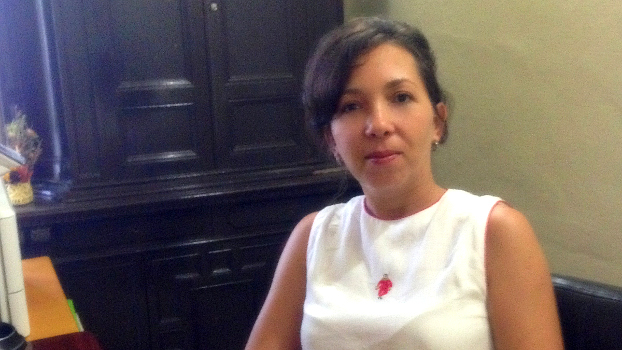
"We must change the predominant cultural and civilizatory model that turns life into a commodity." | Anisley Morejón Ramos, National Program of Climate Change Kuba, Philosophie-Institut Institute of Philosophy Ministry of Science, Technology and Environment, Cuba
"The international UN climate negotiations have put much effort into pushing mitigation of and adaptation to climate change. However, those measures hide the real intentions behind the negotiations. And even more: these negotiations hide the real nature of climate change.
First of all...
TUED Roundtable: Analysis, Allies and Action
6 December | 13.00-17.00 | Hotel Focus Katowice Chorzów, Armii Krajowej 15, 41-506 Chorzów
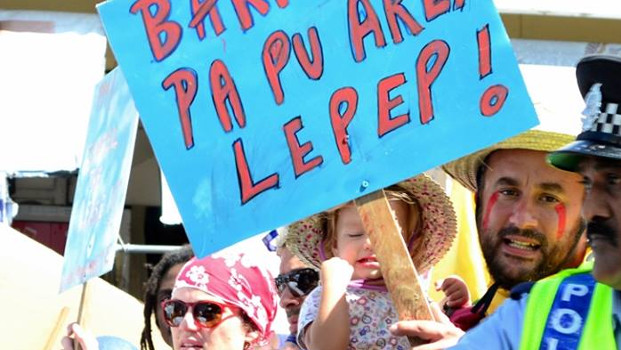
"Mauritius is a small island in the Indian Ocean. An above 1.5° C global average temperature increase means genocide for us." | David Sauvage, CARES, Mauritius
"Being in Katowice we wish to learn from the daily struggles of other grassroot activists, build solidarity and reinforce our own local struggles based on these learning experiences. Mauritius is...
Energy Democracy: Reclaiming Energy to Social Ownership and Full Democratic Control
7 December | 13.30-16.00 | Hotel Focus Katowice Chorzów, Armii Krajowej 15, 41-506 Chorzów
A roundtable of unions and allies advocating for “energy democracy.” The organizers believe social movements, unions, environmental justice and progressive policy groups need to come together...
Energy Democracy: Reclaiming Energy to Social Ownership and Full Democratic Control
9 December | 13.00-15.00 | Climate Hub
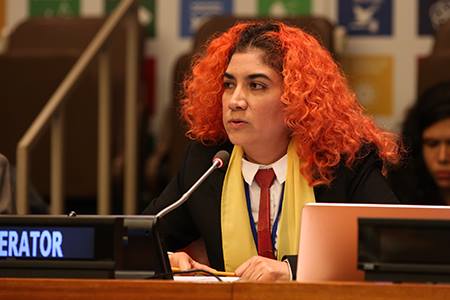
"For the implementation of the Paris Agreement we must strongly promoate human rights, gender equality, just transition, and indigenous peoples' rights." | Emilia Reyes, Gender Equity, Mexico
"The organization I work for is a feminist one based in Mexico. It is currently planning the implementation of a pioneering project on mitigation, gender equality and cities. It is also part of my work...
Do we need a Loss and Damage Fund? - Thinking out of the box for innovative and just finance tools for climate-induced loss and damage
9 December | 19.00-21.00 | Interactive Panel | Climate Hub
Climate change is no longer a future scenario. Its impacts are already visible and harming the most vulnerable people and communities. The Paris Agreement covers this challenge under Article 8 on Loss and Damage. Negotiations under...
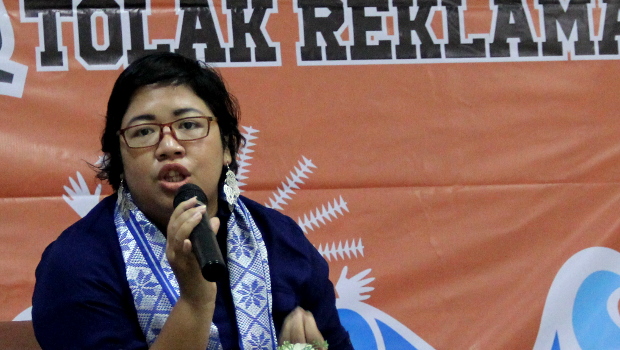
"We want to show how women and communities experience the climate crisis." | Dinda Nuur Annisaa Yura, Solidaritas Perempuan, Indonesia
"We from Solidaritas Perempuan are working together with grassroot women in various contexts. Among them are women peasants, women in coastal areas, and indiginous women living in forests who experience climate crisis as well as false climate solutions and struggling for climate justice. We are also active...
A Just Transition to a 1.5 World – A Global Approach
10 December | 15.30-17.00 | Panel | Climate Hub
Climate change is one of the biggest challenges we are facing today and early action is vital to mitigating the most catastrophic impacts of climate change. If we fail to develop our societies within the planetary boundaries...
From local approaches to (inter)national policy: Gender Just Transition and Decent Work
11 December | 11.30-13.00 | Side event COP24 | room "Warmia"
Just Transition needs to promote rapid decarbonisation, challenge social inequalities and overcome a green growth agenda. We need to question...
Talk show: Do we need a Loss and Damage Fund? - Thinking out of the box for innovative and just finance tools for climate-induced loss and damage
13 December | 10.00-11.00 | Interactive Talk | German Pavillon at COP24
Climate change is no longer a future scenario. Its impacts are already visible and harming the most vulnerable people and communities. The Paris Agreement covers...
Climate Justice Sit-in: A participative discussion on energy democracy
13 December | 13.00-15.00 | Roundtable | Climate Hub
The aim of this event is to bring together climate justice activists, researchers and representatives of NGOs from the Global South with the international and local public in Katowice in order to hold a discussion on energy democracy. Energy has the power to transform people’s lives. Access to energy can grant...
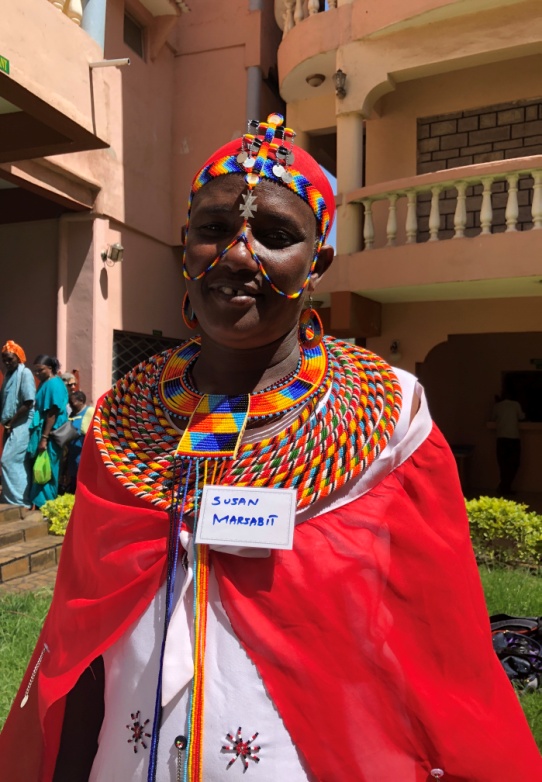
"Governments should address climate change issue as a secuirty issue. It's about the lives of our people and continuity of our culture.” | Susan Aleya, MADRE, Kenya
I'm from the Rendile indigenous peoples community, and we experience food insecurity and lack of water due to lack of rainfall that can take five years. Last year november...
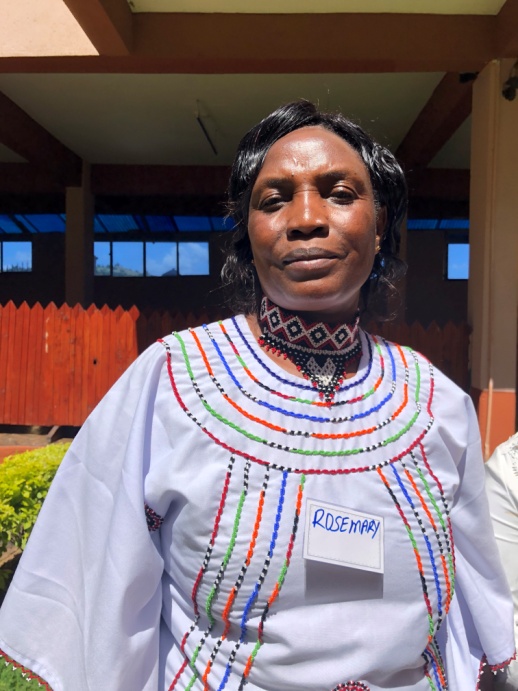
“Time for governments to act is now, tomorrow will be too late.” | Rosemary Mesopirr, MADRE, Kenya
"I'm from the Maasai indigenous peoples community, and as indigenous women we do not have land rights even though it's in law...